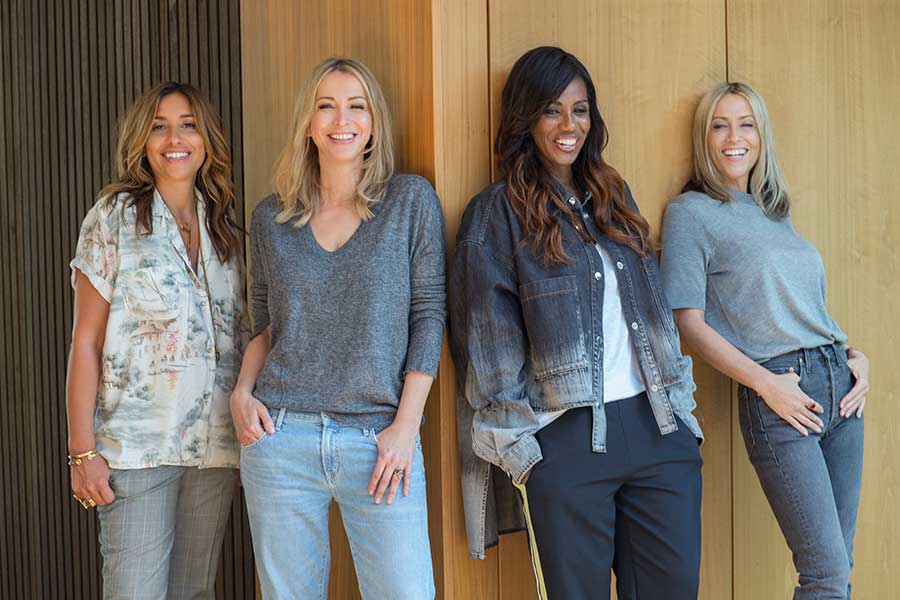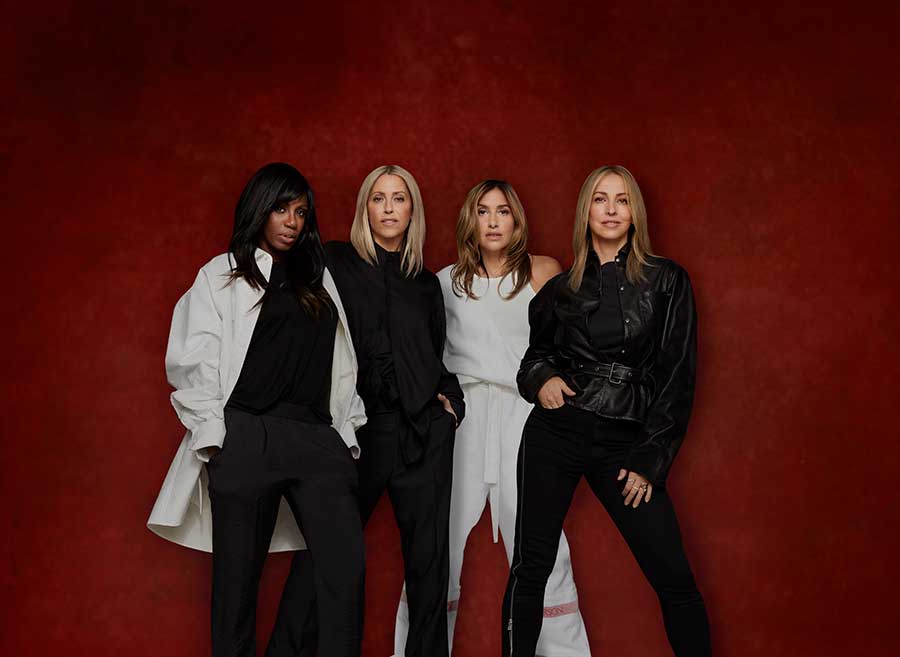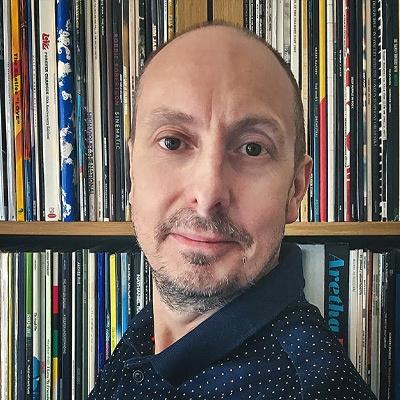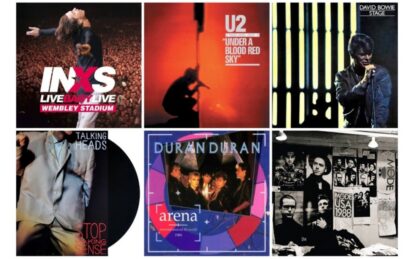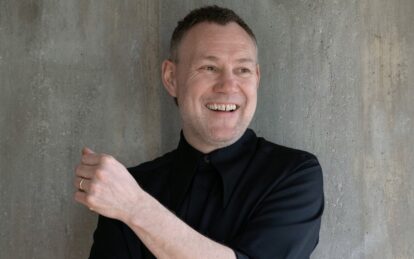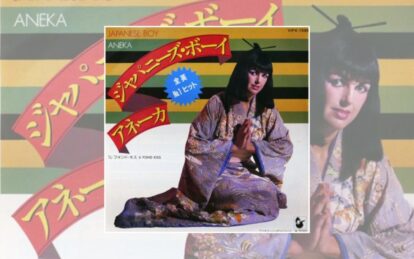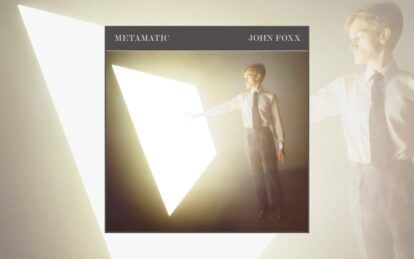
In 2018, All Saints talked to Classic Pop about their then-new album Testament as well as escaping life in the pop goldfish bowl and learning to deal with the pressures that once drove them apart…
All Saints have always stood out from the girl-group crowd. Having more in common with the R&B sleekness of Soul II Soul or the nascent Massive Attack and Neneh Cherry, the only thing they shared with chart competitors such as The Spice Girls was the endless promo merry-go-round they endured in their early days.
Fast-forward two decades and they’ve resolved to do everything on their own terms. Their fifth studio album Testament is the group’s most consistently striking work to date and they’re now heading out on a winter tour – full-length headlining live dates to replace the smash-and-grab TV appearances of their first two LPs.
They’ve endured a much-publicised split and are now in the midst of a hugely successful second act. As Classic Pop spends the morning with the foursome in sun-drenched, leafy North West London, it’s clear the group are closer than ever. The niggles that once drove them apart are a mere footnote, as they look back with the benefit of hindsight on their band dynamic.
There’s a good deal more transparency about the way that All Saints have gone about their business when compared to many of their more showbizzy peers; they’re four very different personalities, each bringing something distinct to the table.
Natalie Appleton explains: “We definitely didn’t fit into that cookie-cutter mould of manufactured bands. I think that’s why we always felt like outsiders. We didn’t conform to the rules. The way the four of us are different, made our music different. We were never going to fit into any one single category, although we were certainly influenced by bands like En Vogue, SWV and TLC originally.”
Party streamers
As we meet at their management HQ, they’ve just compiled separate Spotify playlists, giving an insight into their musical tastes. Shaznay Lewis’s hip-hop flavoured selection cherrypicks Beastie Boys, Public Enemy, A Tribe Called Quest and Wu-Tang Clan, while Natalie’s 80s classics include George Michael, Oran “Juice” Jones, Duran Duran and Frankie Goes To Hollywood – Nat, your Classic Pop subscription is in the post…
Meanwhile, Mel Blatt’s mix of current and retro R&B features The Internet and Chloe x Halle, alongside classics from Sade and Janet Jackson. It’s Mel that still keeps an ear on cratedigging for current sounds: “I’m a bit nerdy. A bit of a boffin,” she shrugs. “I like finding out what’s going on out there, especially when artists I admire put up their own choices in music they’re listening to.”
Nicole Appleton has heard her own playlist over her gym’s PA that morning. “It went down brilliantly!” she says with no little pride about her rock and grunge selection that includes Nirvana, Soundgarden, Smashing Pumpkins and Nine Inch Nails. She’s not exclusively a rock chick, though: “It takes me a while, but once I latch onto something I become obsessed with it. Like Ariana Grande.
“I don’t actually listen to Radio 1 or anything that’s current, but I do appreciate it. I have a 17-year-old son who plays me stuff and I just don’t get it. He’s into lots of grime. But I don’t know who sings what. There’s a lot of great stuff out there, but I’m just not on the ball with who’s who and who sings what. Even with female solo artists…”
Talk the talk
Unafraid to speak their own minds, All Saints are a world away from the current crop of media-trained pop stars who shy away from stating their opinions. “Could that be an explanation of the resurgence of why people are going back to old eras?” offers Shaznay. “When we were teenagers, or younger in the 90s, there weren’t loads of bands from the 70s and 80s going on tours. That’s very much a ‘now’ thing. Is that because of social media?”
“People don’t have to be offensive, but it would be good if they were just seen to be passionate, you know?” adds Nic.
He may have blotted his copybook, but even Nicole’s ex-husband Liam Gallagher gets the nod of approval over the current bland generation. Her sister Natalie adds: “It’s refreshing when someone has a character. I enjoy it when Liam G says outrageous things. He can get away with it.” (Nic rolls her eyes, knowingly.)
Are those great rent-a-quote characters largely missing with pop artists afraid that an unpopular opinion will go viral and send their careers into a nosedive? It’s taken Taylor Swift several years to finally voice her own political opinions: “I think that’s why you get to know reality stars nowadays more than pop stars, because you’re seeing them in certain environments,” says Shaz.
“Whether they’re saying good things, bad things, whatever, at least they’re saying something. Whereas with the new pop stars, you’ve got absolutely no idea what they’re like. They all blend into one.”
“You don’t know anything about them – then suddenly they’re a heroin addict,” laughs Mel. “Where the fuck did that come from!?”
“Remember back in the day, Britney was like that. Her interviews were very safe and she didn’t say much of any substance. Now she’s come out of her shell. It’s nice to see her real self, rather than what she’s been told to be like,” adds Nic.
- Read more: Bananarama – album by album
The topic of George Michael’s resolute digging in of heels around Listen Without Prejudice Vol.1 comes up. Although the quartet were more strong-willed than most, that level of artistic intransigence was still a step too far.
Shaznay explains: “You have to be an artist that big and have that much power to be able to make a statement like that. I don’t think a band like us could ever have got away with it. We certainly tried! We asked: ‘Can we not be in our videos?’ Can we not be on the cover?’
“That’s when you’ve got to go right to the source of the whole thing and put the creatives with business. It’s never going to work, really, because you’re never gonna get a creative’s full potential – because there’s a business involved, a pricetag.
“Other people are making money from that creativity. So even when the artist needs a break or wants to stop, there’s a whole company of thousands of people that need to get paid. It can never truly work, that relationship. Which is why I think we’re really lucky now that we made the decision to try to do this for ourselves.”
The voice in my head was right
The band’s superb new album Testament distils everything we’ve grown to love about the foursome over the past 20 years, but also pushes their sound forwards.
“The main thing that we wanted to do our way was the new record itself,” explains Shaznay, the Ivor Novello Award-winning chief songwriter in the group. “When we made our albums beforehand, tied to a label, it was all based on sales and being in that environment. I don’t think we made the best albums that we could. I think we’ve made better albums under our own umbrella. We compromised a lot back in the day, but we were young. You’re being asked by the biggest A&R people in the country to come up with hits and that’s all they’re concentrating on.
“By the time we got to our second album [2000’s Saints & Sinners], you don’t actually trust your own ears, and you think they should know better. But that’s not actually how it should be either. An artist should be making the music that they want to make, and if it fails, then it fails. At least it’s made authentically. Having said that, I feel actually that there hasn’t been a lot of things we’ve had to say no to. Because of the music we’ve made, the right things have come along with it.”
“With Testament, we funded it ourselves. Literally, we’ve been left to do exactly what we want to do with it,” Natalie adds.
The album is awash with highlights. There’s a knowing nod to the iconic intro to Never Ever, with Nic reprising her spoken-word role on Who Do You Love, but Testament, is, well, testament to a group who are resolutely striding into the future with a forward-thinking agenda. There’s nothing nostalgic about club banger Three Four, or the pulsing electro pop of Love Lasts Forever.
All Saints fans have been excited by one retro nod, though – the return of William Orbit, the man behind two of their biggest successes, Pure Shores and Black Coffee, who provides his trademark twinkling electro soundscapes on new track After All.

Once more, the lynchpin behind the mixing desk is producer and de facto fifth All Saint, Karl Gordon, aka long-term collaborator K-Gee. “He really is the root of everything,” explains Nat.
“He’s the thread that goes back to the beginning. It’s just a relationship that really works, you know. Whoever comes in brings something different, but ultimately, he’s the thread that [binds our sound together].”
“In the beginning, most of the demos that we brought to the label for our first album were done with K-Gee apart from Never Ever. But at that time, it was the start of Karl’s career, so in ‘industry world’, the kind of very urban music that he was bringing,
“I suppose the labels just wanted to add a commercial edge to it, or a leftfield edge to it when we talk about people like Cameron McVey. But it was always Karl’s music. Even if someone else was brought in to help on it, it was Karl’s stuff,” adds Shaz.
Behind the mixing desk on their eponymous debut was a veritable Who’s Who of UK urban producers – Nellee Hooper and Cameron McVey helped shape Massive Attack’s seminal Blue Lines (Hooper was also a key member of Soul II Soul for their first two albums), and Jon Douglas, who also worked with George Michael on his comeback LP, Older. Douglas had worked with Shaznay and Mel from their earliest days in the music industry when signed to ZTT.
Take Nellee to the beach
On Testament, there’s an intriguing blend of established producers (K-Gee, William Orbit) alongside cutting-edge talents such as Pete ‘Hutch’ Hutchings and Fred Ball. Key to the success of the new record is Lewis’s team-up with George Moore on the writing and production front.
Shaznay explains: “The more established people that we’ve worked with in the past, that’s a comfort. George Moore happens to be our band MD. We’re always up for working with new people if they’re bringing interesting sounds and ideas to the table. Once their ideas are things that we can work with and put our own stamp on, that’s always something we’re up for.”
He may have been the go-to producer in the 90s, but it seems that Nellee Hooper, the man behind classic hits for Madonna, Björk, Sinéad O’Connor and U2 is still missing in action, revelling in the hard-won spoils of victory on a far-flung beach.
“We’d love to get Nellee back, but he’s always on his holidays all the time! I think he’s just enjoying the fruits of his labour, to be honest,” says Mel. “You know, sometimes people come out of retirement, but I’d love to work with Nellee again,” adds Nat.
Following the critical and commercial success of their second comeback album Red Flag, Testament seals the deal. To quote the bard Barlow, they’re back for good… the road back, though, after their initial split in 2001, wasn’t always smooth.
Their much-underrated first attempt at a return, 2006’s ska- and reggae-tinged Studio 1, was a false dawn. Mel was the most reluctant member to restart the band and admitted that the money on the table was the primary reason she agreed to a reunion: “It’s not so much the music on Studio 1 that I was critical of, it’s more how it came about that I had issues with,” she shrugs.
“It’s just not an album that I can relate to. We were signed before we even made a demo for it. The [record label] didn’t know what we were capable of at that point. We should have come back with a jazz-skiffle album, just to piss them off.”
When second single Chick Fit failed to reach the Top 200, record label Parlophone parted ways with the group. Promotional duties were scrapped. So, too, was a planned UK tour. The reunion stalled before getting out of the starting blocks.
That might have been it for All Saints, were it not for a chance phonecall from Backstreet Boys, who in November 2014 offered them a support slot on their five-date UK tour the following year.
It planted the seed that perhaps here was a way for the quartet to ease themselves back into the limelight and power up the All Saints mothership once again. “When that opportunity came about, we jumped at it because we hadn’t really toured or done that many live shows in the past,” Shaznay explains. “Just to have that opportunity and not have the responsibility of selling the show or promoting it… just to go out there and do a 45-minute set, it was great.”
Mothers of invention
Now all mothers, the foursome are continually asked about the realities of having a family while being in a touring pop band. It’s not something journalists would ask of Coldplay or Muse, but this potentially sexist line of questioning could be seen as proof of the centrality of mothers in the family unit.
“People don’t ask Liam and Maxim about it!” exclaims Nat of The Prodigy’s on-the-road setup. Shaznay adds: “For us especially to be able to walk out of the door and do what we do, we’ve got to get things covered. I can’t just get up and say to my other half: ‘Babe, I’m off on tour with the girls. See you in two weeks’. It doesn’t work like that. Every aspect of our childrens’ lives has to be covered before we can even get one foot out of the door.”
The everyday challenges of family life may have put the members’ own personal differences into perspective. Suffocated inside the pop goldfish bowl of the 90s and early 2000s, their split was bitter. Their candour about it has been refreshing, but equally impressive has been the way that they’ve put their issues behind them. You see them lolling together on their manager’s sofa and you’d be amazed they’d ever had a cross word in 20 years-plus…
“Our humour has stayed the same, which is a big thing for us,” Nic explains. “It’s what makes us happy and helps us to enjoy going to work together. We laugh 90 per cent of the time. We’d get a lot more done if we didn’t. We always had the sense of humour, but there were a lot more things going on in the background.”
“There are still niggly things, but it’s the way you deal with them now that’s important,” Shaz adds diplomatically. “At such a young age, you don’t always see the bigger picture – we weren’t playing the long game. 20 years down the line, you actually appreciate that long game.
“Unlike a lot of bands, we were actually best mates, too. So after we finished working in the day, we’d go out partying together. We were in each other’s lives constantly. There was never any chance to take a step back and look at the situation.”
“I’ve known Mel since she was really little, then having to have this business relationship as equals, it became really weird. It changed the dynamic,” says Nat. “We had to deal with business, but then I view Mel [and Nic] as my two little sisters. We’d have definitely lasted longer if there wasn’t that pressure-cooker feeling on us.”
“I kinda like our naivety about the whole thing, though,” argues Mel. “The fact that we decided to end the band because we fell out, we didn’t get on any more. Money couldn’t have made us stay together. They tried that, but we sent the money back. That’s something I’m very proud of. I’d have appreciated all four of us having someone trustworthy as an outside party who had our best interests at heart.
“Someone who advised us to watch our friendship, other than worrying about the business side. I think if someone had advised us to do that, we’d have listened. Nobody was just interested in us as four friends, there was always a business angle attached to it.”
With a little experience, too, comes the realisation the live shows won’t be packed with high-octane dance routines. Even back in the day, though, All Saints preferred their textbook shoulder roll to the full-on choreography of their chart rivals. “In the beginning, we did a bit of choreography… before we got bad knees,” laughs Nic. “Now it’s more about singing. We want to make sure that instead of jumping around and getting a stitch, we get the performance right. We still do the shoulder roll…”
“I think at this stage of the game we know where our strengths are at,” adds Mel, “and big choreography is not what we are going to win at!”
- Read more: Making Madonna’s Like A Virgin
Classic Pop may earn commission from the links on this page, but we only feature products we think you will enjoy.

